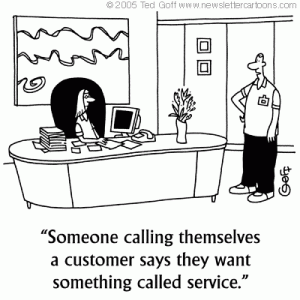- An unhappy customer tells 20 people about a negative experience with your company.
- When a company solves a customer problem, that customer is five times more likely to buy from that company again and recommend them to their friends.
How Can You Get Better?
Make It Easy to Contact You
I once let a business owner know how hard it was to find their phone number on their website. “I know,” he said, “I just don’t want my customers to bother me all the time.” “You’re kidding me, right?” I asked. “Your customers are the only thing that is keeping your business alive. If you’re not truly passionate about serving them, how can you succeed?” As it turned out, he didn’t: six months after that conversation he was trying to start a new business because the previous one “didn’t work out.”
You have to be obsessed with making your customers happy no matter what it takes. I’ve lost money with a few dozen clients in my life, but doing the right thing always paid off: those clients stuck around and became our biggest advocates. If you consider your customers an annoyance, go get a job (and not one in customer service).
Manage Expectations
Most businesses make the same critical mistake: they over-promise and under-deliver. I’m guilty of having done this myself. Sometimes, as business owners, we get so excited about what we have to offer that we tend to set expectations very high. There are a few different ways you can manage expectations well:
- If you think something will be done by Wednesday, tell your client it will be finished by Friday. That way, if something happens, you have two extra days. And if everything goes according to plan, your client will be happy you finished before the deadline.
- If you’re 100% sure you can do most of a project and only 50% sure you can do the rest, talk about the first part only. That way, if you pull off the second part, it will be a bonus. Alternatively, tell your client that the chances of getting the second part done are really low and even though you’ll do your best, you can’t promise anything. Doctors do this very well.
- Be very honest about everything that can go wrong and explain what you are doing to minimize the chances of those things not working out. Clients really appreciate honesty.
Solve Their Problems
This is my favorite question to ask a customer in distress: “If you were in my shoes, what would you do to make things right?” Some companies are afraid to ask this question because they dread getting a request they can’t accommodate. But when that happens, just explain you can’t do it and try to find the closest possible solution. It really helps knowing what outcome your customer expects. And most of the time, you should be able to solve their problems in the exact same way they suggested, which will earn you a lot of goodwill (and potential referrals) from that customer.
Apologize the Right Way
The owner of a PR agency once told me “Never apologize. If you do, you’re admitting guilt.” My answer was “So what? If you screwed up, it’s not only ethical to admit guilt, but it’s the only way you can solve a problem.” Take responsibility for your mistakes. The photographer I hired for my wedding had a problem with their memory card and all our wedding pictures were lost forever. Instead of taking responsibility, he said “well, sometimes technology doesn’t work. It’s just the way it is.” That made me mad; not only could he have backed up the pictures, but even if the problem was with the technology he was using, I hired him and he was the one who needed to apologize (not the camera).
When you screw up, apologize sincerely, explain what you are going to do to make sure it doesn’t happen again and ask what you can do to make things right. Every company in the world makes mistakes; the way you take responsibility for those mistakes makes all the difference.


